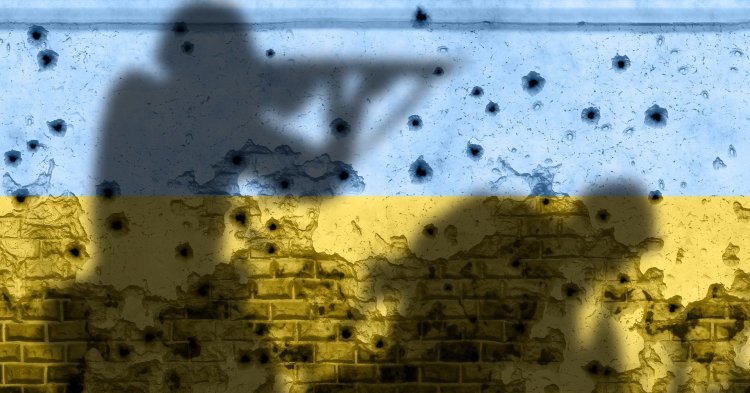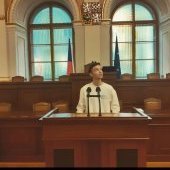Russia is an authoritarian state in clear decline, a decline that Putin has not been able to respond to by conventional means, not least because Russia is facing a clear scenario of economic and social decay, having been left behind by many other states.
This situation opens a new paradigm of a Russia desperate to find new ways to reassert itself as a great world power. As Joseph Nye stated, a state in decline has a greater propensity to take more risks and to dare to follow much more ambitious and risky paths and strategies, something that can be clearly seen in Vladimir Putin’s strategy. An example of this was the annexation of Crimea, a bold move, but one that demonstrated that Putin is willing to do whatever is necessary to revitalise the Russian Federation.
The whole situation we are currently experiencing is the culmination of several years of a strategy rooted in a basis of “hybrid warfare”, in which the notion of sharp power emerges as a way for some regimes to carry out their foreign policy. This term comes within the scope of International Relations and typically involves actions of censorship or the use of manipulation to undermine the integrity of independent institutions. Sharp power has the effect of limiting freedom of expression and distorting the political environment by attempting to cause disinformation and destabilisation of democratic regimes.
This sharp power is a fairly recent weapon in the field of International Relations and its effects have been increasingly evident: in the Russian influence in the American elections in 2016; in the British elections of 2020; in the constant attempt to steal personal data of several European citizens or even the artificial refugee crisis that Putin supposedly weaponized in 2021 to hurt the European Union in an area where the supranational institution has always found grave difficulties in dealing with the humanitarian problem.
Putin tries to take advantage of the greatest weaknesses of democracies and makes the most of all their weaknesses, exploiting them and taking advantage of the asymmetries between free regimes and others not so much, ultimately causing terrible instability.
We are currently seeing the effects of the disinformation campaign that has been generated. Russia ends up invading Ukraine and, for the time being, the West’s capacity to respond remains very low, perhaps because Putin has found the ideal point to launch his offensive. Merkel withdraws from the scene and the European Union loses its most respected figure on the international stage.
On the other hand, there is no consensus on the energy transition and the friction between France and Germany is enormous. By investing massively in solar and wind energy, and without any kind of plan for a renewable energy source to underpin this energy transition, Europe would always be especially exposed to fluctuations in the natural gas market. Furthermore, the European Union has chosen to be dependent on Russian gas, with around 43% of the energy needs of the entire European bloc currently coming from Russian soil and the Nord Steam 2 project clearly evidences Germany’s dependence on Russian gas. Western society is increasingly immersed in the discussion of ethical and moral values and warmongering movements are more and more distant.
Furthermore, Russia signed an agreement with China to have a greater political, economic and military cooperation, already thinking about the possible sanctions that could come from the West and, curiously, the Russian invasion of Ukraine takes place one day after the closing ceremony of the Winter Olympics.
The Russian president has never accepted the dismantling of the Soviet Union in 1991 and considers the extension of NATO to these countries a threat. In 2005, in his State of the Nation speech, Putin called the collapse of the Soviet empire the greatest geopolitical catastrophe of the century. This coordinated attack comes just three days after Vladimir Putin announced that Moscow would officially recognise the breakaway republics of Donetsk and Lugansk in eastern Ukraine as independent states. The territories recognised by Putin went beyond the areas controlled by pro-Russia separatists.
The Ukrainian people awoke at dawn to sirens blaring, shelling and hearts already lost among the wreckage of Kiev. These are the darkest hours in Europe since World War II. Not only do we live at a time in human history when wars can no longer be won by anyone, but the aggressor is Russia - a member of the UN Security Council. Putin is a war criminal, a dictator who has paved the way for destruction and a cataclysm to befall Europe’s borders. This is a clear violation of international law and all the human rights present in the UN Charter.
Poland and the Baltic countries, Latvia, Estonia and Lithuania, have declared the activation of Article 4 of the Treaty establishing NATO. In the history of NATO, founded in 1949, Article 4 has been invoked six times. The first time was in 2003, when it asked the alliance to protect its population from collateral damage from the war in Iraq; twice in 2012, in response to the shooting down of a Turkish plane in Syria and the death of Turkish citizens by Syrian bombing; in 2015, to inform NATO of its response to terrorist attacks in the country; and most recently in February 2020, after dozens of Turkish soldiers were killed by Syrian government forces in Syrian opposition-controlled areas in the north of the country. On two of these occasions, in 2012 and 2003, NATO responded by sending arms. The other moment when Article 4 was activated was in 2014, by Poland, in response to the first Russian moves against Ukraine in the Donbass, Lugansk and Crimea regions.
Multilateralism is tired. After the Second World War, it was believed that we could face and solve global challenges if states worked together. Those challenges that have no borders because of their size. That is unfortunately the state of multilateralism in the 21st century world, at a time when we need it most. Populists don’t believe in multilateralism because they think that everything can be solved at the national level in this world we ive in, but it cannot. They believe in a pre-World War II world and they would have us believe that that world was better like that.
We should never forget that organisations like the European Union, NATO and the UN were created to rid us of that world, where everything was national and where war was the only way to solve conflicts. For years the West was deluded by a pseudo-democracy in Russia and let it go. We have built up a dependency on Russia and the West is weak, adrift and without true leadership.
The solution is far from simple and all we hear is “condemnations”. Neville Chamberlain also condemned Hitler after the invasion of Poland. In Politics, nothing happens by accident. The point in History at which we stand is full of promise and danger. The world will either move forward toward unity and widely shared prosperity or it will move apart. It is not sufficient just to want - we have got to ask ourselves what we are going to do to get things right.
All war is a symptom of Man’s failure as a thinking animal and there is no flag large enough to cover the shame of killing innocent people. We got used to the idea that dangers were far away and would never affect us, but war has returned to Europe. The fate of the world is decided in Ukraine and this lack of international response will set a dangerous precedent for decades to come.
The world has lost its way and, eighty years later, Charlie Chaplin’s words remain more relevant than ever. We have woken up in 1939 and a new Iron Curtain is rising in Europe


Follow the comments: |
|
